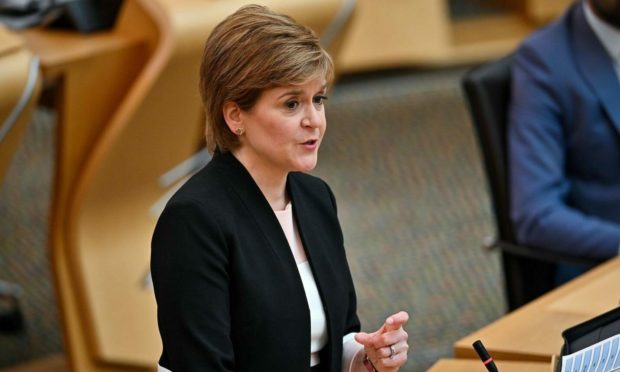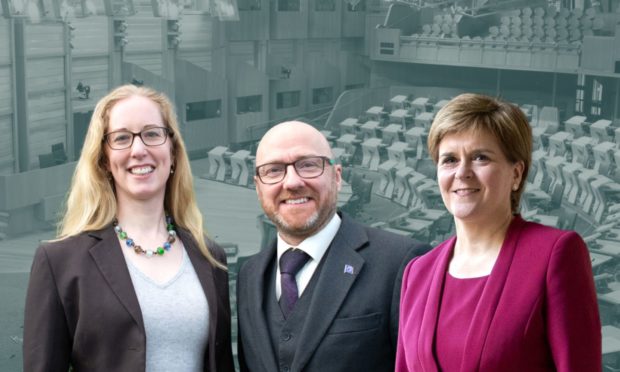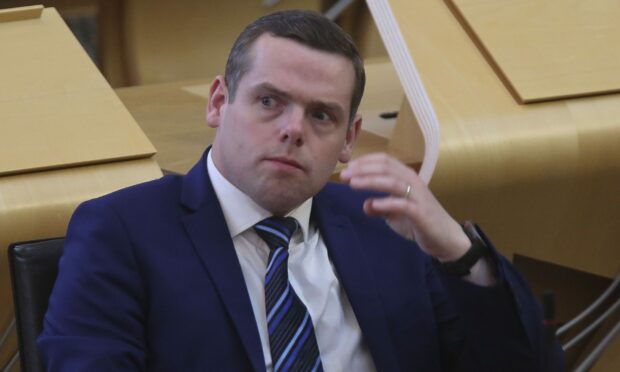The First Minister insisted the new deal between the SNP and Greens gives her a clear path to hold another vote on Scotland’s future in the UK.
Nicola Sturgeon said the constitutional question is a “key plank” of the two parties’ programme as MSPs returned to Holyrood after summer.
Politicians split along party lines on Tuesday afternoon as Patrick Harvie and Lorna Slater were formally voted in as junior ministers in a ground-breaking pact putting Greens in the Scottish Government.
Ms Sturgeon said the co-operation agreement will tackle climate change, the recovery from Covid-19 and the impact of the UK quitting the EU.
But she said there is also a clear democratic mandate to let the Scottish people choose our own future”.
The First Minister insisted: “The mandate for that is undeniable – between us, the SNP and the Greens hold 72 of the 129 seats in this Parliament and each one of us was elected on a commitment to an independence referendum.”
She added: “The decisions that will shape our society and economy and our place in the world must be determined, democratically, here in Scotland and not imposed upon us, so often against our will, by government at Westminster.”
The First Minister stressed the agreement that has been reached between the two parties was not a full coalition – a position opposition members tried to ridicule in the debating chamber.
For the first time in UK politics, it will see Greens enter national government as ministers, working in a spirit of common endeavour.
– Nicola Sturgeon.
The deal, published on August 20, set out their shared policy platforms and paved the way for two Greens in government.
Today Ms Sturgeon said: “For the first time in UK politics, it will see Greens enter national government as ministers, working in a spirit of common endeavour, mutual challenge and collective responsibility to deliver for the people we serve.”
‘Simply a joke’
Scottish Conservative leader Douglas Ross branded it a “nationalist coalition with one overriding goal – separating Scotland from the United Kingdom”.
He insisted: “Trying to claim that this is not a coalition – that is quite simply a joke even by SNP standards.”
Mr Ross said the deal had taken priority over the programme for government – the statement setting out the Scottish Government’s plans for the next 12 months, which is normally announced when MSPs return after the summer recess.
“Yet again a divisive referendum has come first, as it always does with this government,” Mr Ross said.
“Once again the SNP have got their priorities all wrong.”
He continued: “This is not a deal that works for Scotland. This is a deal that works for Nicola Sturgeon.
“She failed to get a majority and this deal is a consequence of that.”
Meanwhile, Scottish Labour leader Anas Sarwar said: “This is no new government, this is not a clean start, this is a deal that more about the constitution, not the climate.
“It’s about greater control for Nicola Sturgeon and the SNP, not co-operation.”
He argued ministers should instead be focused on tackling issues such as unemployment, child poverty, the drugs deaths crisis and tackling the backlog that has built up within the NHS.
Lib Dem leader Alex Cole-Hamilton added: “By putting nationalism ahead of the climate emergency, Patrick Harvie and co have revealed their true colours. Those colours look far more like the acid yellow of the governing party than the proud emerald of the global green movement.”
Greens say it’s Tories who are ‘extreme’
Mr Harvie is the new minister for zero carbon buildings, active travel and tenants’ rights, while Ms Slater is the new minister for green skills, circular economy and biodiversity.
Green MSP Ross Greer, speaking before his colleagues were voted into power, hit back at Tories who have branded the party “extremist” daily since the deal was announced.
Mr Greer referred said Tory MSPs Stephen Kerr and Mr Ross had helped support the “extremist” DUP to keep Conservatives in power at Westminster.
“Those of us committed to working together in the interests of people and planet will be taking no lessons from the extremist-enablers on the Tory benches,” he said.
Holyrood’s presiding officer, who was originally a Green MSP, announced changes to the party’s status in parliament because of the new deal.
The party will no longer be entitled to a leader’s question at the weekly First Minister’s Questions session. The Presiding Officer, Alison Johnstone, also said she will no longer automatically call the party to speak at the start and close of debates.
The party’s “short money” – public funds paid to political parties to assist MSPs perform their parliamentary duties – will also be reduced by £15,687.


